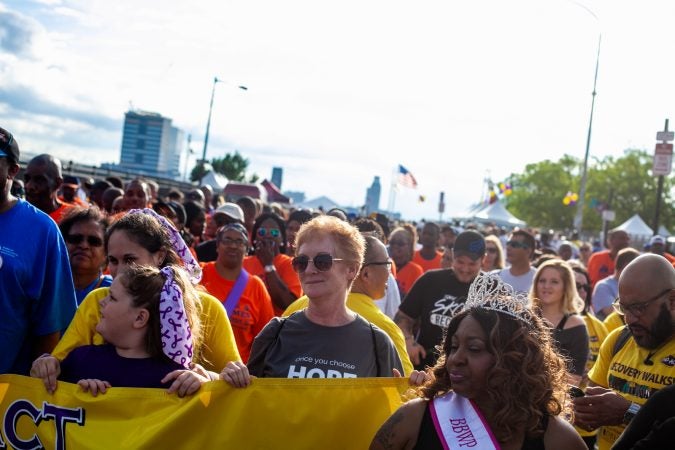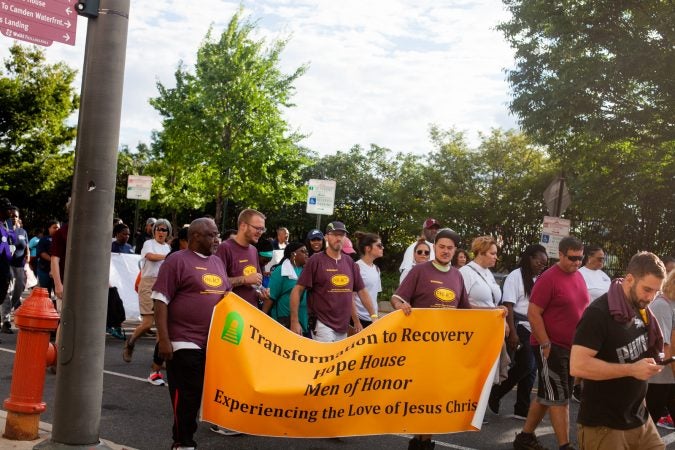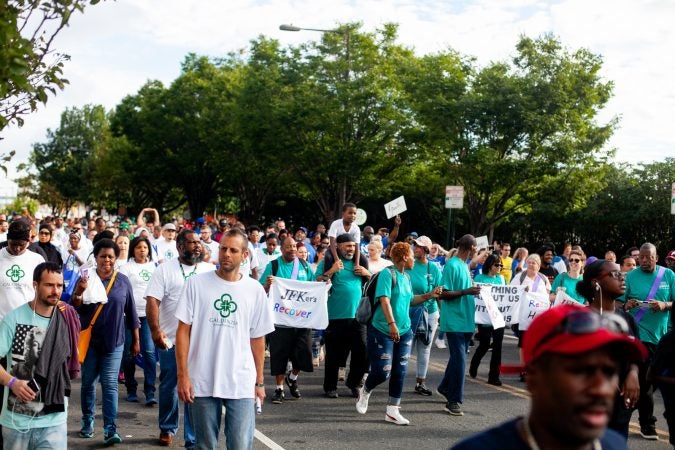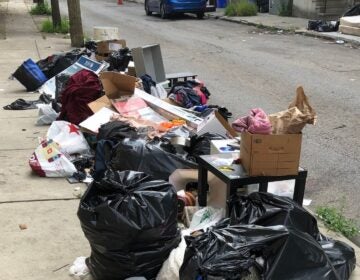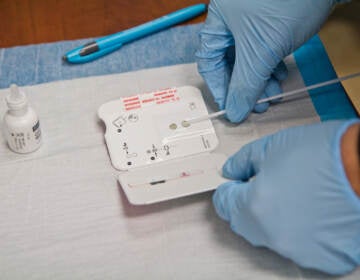In Philly, U.S. surgeon general calls for opioid crisis ‘interventions that are legal’
Nearly 30,000 people gathered Saturday morning at Penn’s Landing for Philadelphia's 17th annual Recovery Walk.

Participants in the 2018 Recovery Walk return to Penn’s Landing Saturday morning. (Brad Larrison for WHYY)
U.S. Surgeon General Jerome Adams was among the nearly 30,000 people who gathered Saturday morning at Penn’s Landing for Philadelphia’s 17th annual Recovery Walk to reduce the stigma surrounding substance use.
People of all ages and races, some of them with 20 years sober and others with 20 days, took the rare opportunity to celebrate recovery amidst a grim crisis that left more than 1,200 dead in Philadelphia last year.
While expressing support for local efforts to deal with the crisis and prevent more deaths, Adams stands behind Deputy Attorney General Rod Rosenstein, who said in a recent interview with WHYY that the federal government would take swift action against any city that deemed it an appropriate local solution to establish places where people addicted to drugs can use under medical supervision, as Philadelphia has pledged to do.
“The DOJ has made it clear they consider them to be a violation of the Controlled Substances Act,” said Adams. “From a public health point of view, I’m focused on evidence-based interventions that are legal.”
Adams said his office is working to expand access to medication-assisted treatments (MATs), such as buprenorphine and naltrexone. For the better part of the crisis, recovery has been largely abstinence-based, but mounting research points to the success of MATs, which help curb cravings and stave off withdrawals that often promote relapse. The drugs also prevent a person’s tolerance from being reduced so dramatically that if they do relapse, they are more vulnerable to overdosing. Last year, more than 9,000 people on Medicaid in Philadelphia received some form of MAT.
For low-income people struggling with addiction, access to care is most often contingent upon Medicaid, which the Trump administration has made various efforts to scale back.
Asked how more people could access treatments such as MATs if fewer people have access to insurance, Adams said it should be up to the states to decide how to offer solutions to the crisis.
“We believe the federal government should get out of the way, because the opioid epidemic is local, health is local, and the solutions need to be local and locally led,” he said, stressing that communities should put resources behind programs like syringe exchanges, which have been proven to reduce risk of hepatitis and HIV, and giving out naloxone, the opioid-reversal drug. Syringe exchanges are technically still illegal in Pennsylvania. Former Philadelphia Mayor Ed Rendell sanctioned them in the city in the 1990s through a city ordinance. At the time, federal officials threatened to crack down on them as well.
Adams — who said he has supported his brother, now incarcerated, during his struggle with addiction — said his biggest priority is fighting stigma.
“I’ve always said it’s our biggest killer out there,” said Adams, who was joined at the Recovery Walk by his three children. “If we can fight stigma, then we can tackle Medication-Assisted Treatment, we can improve drug courts. Then we can make everything better.”
Cities all over the country host similar walks during September in honor of National Recovery Month, but Adams said he came to Philadelphia’s because it’s the largest. That’s in line with the scale of addiction here — Philadelphia has the highest overdose rate of any large city in America.
The walk is hosted each year by PRO-ACT, an initiative of the Council of Southeastern Pennsylvania, which advocates to reduce the stigma around substance use, as well as direct support for those in recovery.
Patrick Hanvey, 21, was there was his self-described “recovery puppy,” Butler. Hanvey got Butler when he first got clean.
“You know, you do something selfless for once instead of worrying about yourself for a little while,” said Hanvey, who is in treatment after a recent relapse. He was celebrating one month sober at the walk.
As more people die, more people are getting help, too. Almost 3,000 people on Medicaid stayed in residential rehab facilities in Philadelphia last year, more than double the number that did in 2010. More than 9,000 Medicaid recipients received outpatient therapy for addiction.
Roselyn Melvin is celebrating 23 years drug-free, and is a member of the so-called “Honor Guard,” comprised of those with more than 10 years of sobriety.
Her fifth year at the walk, Melvin said she was grateful to see so many people in recovery gathered in one place to celebrate, rather than using or getting in trouble with the police.
“When I was using drugs, I got locked up and punished for it,” she said, with her daughter by her side.
“All of these clean people out here with their babies, they dogs, they children, it’s an abnormal state we’re in. But it’s good,” she said. “God has taken the bottom of the barrel and put us on top to show the world how to live. This is the new normal. It’s cool.”
—
Clarification: This article has been updated to clarify that syringe exchanges are illegal in the state of Pennsylvania, but are sanctioned in Philadelphia through a city ordinance.
WHYY is your source for fact-based, in-depth journalism and information. As a nonprofit organization, we rely on financial support from readers like you. Please give today.




